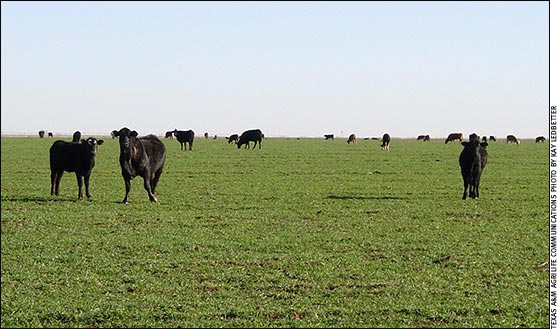
Corn Prices Affect Leasing Decisions
Wheat, stocker cattle lease decisions impacted by corn prices.
With all the rain in July, things are looking a little more optimistic for wheat and stocker cattle operators than in the past four years in the Rolling Plains of Texas and southern Oklahoma, according to a Texas A&M AgriLife Extension Service specialist.
“It looks like we will have some pasture once we get our wheat crop in; at least we have some moisture to plant our wheat on,” said Stan Bevers, AgriLife Extension economist in Vernon, Texas.
That leaves wheat and stocker cattle operators with some decisions to make in the next few months.
“What we are looking at now is, ‘Should I try to harvest for a wheat crop next spring, or should I run cattle through the entire season?’ ” Bevers said.
While little to no corn is grown in the Rolling Plains region, the corn market has a big impact as it is the intersection between cattle and wheat, the two largest commodities of the region.
“Right now we have a very large corn crop growing out there, which looks like it will influence wheat prices to the lower side,” he said. “So that’s kind of a dark cloud hanging over wheat. We have to ask ourselves, ‘What will prices be come spring next year?’ It certainly appears that it is going to be lower than the last few years.”
Bevers said the Aug. 10 corn report reported the largest corn crop in history at 14 billion bushels (bu.). If the price is to start moving up, it will be after that. On July 29, the July 2015 wheat contract price was $6.30 per bu. Adjust for local basis and the local price is between $5.75 to $6.
“What are your expenses per bushel — about $6 a bushel, depending on yield average,” he estimated. “So there are a couple of options to look at when it comes to the wheat crop we are about to plant.”
One option for the Rolling Plains is to graze stocker cattle on wheat pasture for a portion of the year. The problem with that is stocker cattle are very expensive right now, Bevers said. Cattle as a whole are in very short supply, so producers must understand they are going to have to pay very high prices.
“So one of the things we’ve talked about is if I don’t want to own the cattle and make that investment, we can take cattle in ‘on the gain,’ ” he said.
The next decision will be: What should the lease price on wheat pasture be?
He said the wheat producers want all they can get and the stocker operators want to pay as little as possible.
The wheat guy needs enough to make him whole again, knowing with grazing he will lose some bushels and have some increased expense, “So you as the stocker operator need to pay him enough to get him back to where he didn’t graze it at all — and then some.”
From the wheat producer standpoint, the things that come into the equation are a 5- to 6-bu. loss per acre, a heavier seeding rate and added fertilizer, which averages out to about $11 per acre, he said.
The stocker operator has to determine the maximum he can pay by looking at everything except pasture costs.
“Using the numbers we have now, the average is about 62¢ per pound of gain,” Bevers said. “That’s what a wheat producer and stocker operator would kind of negotiate as the mid-point to start the bidding, and that number could go as low as 55¢ or as high as 64¢.”
The wheat producer has to have 54.1¢ per pound of gain to make him whole again. The stocker operator can pay up to 70¢ for him to generate zero.
“So this becomes a lease negotiation — 62.2¢ would be a meet-in-the-middle type of situation — but not everyone plays nice together. And, all this changes on a daily basis,” he warned.
“There are lots of options to consider, so you have to run your own numbers,” Bevers said. “But at least this year we have some moisture to think about.”
For more information, check out Texas AgriLife’s video at http://youtu.be/vyvLaZuLtUA.

Editor’s Note: Kay Ledbetter is a communications specialist for Texas AgriLife Communications.





